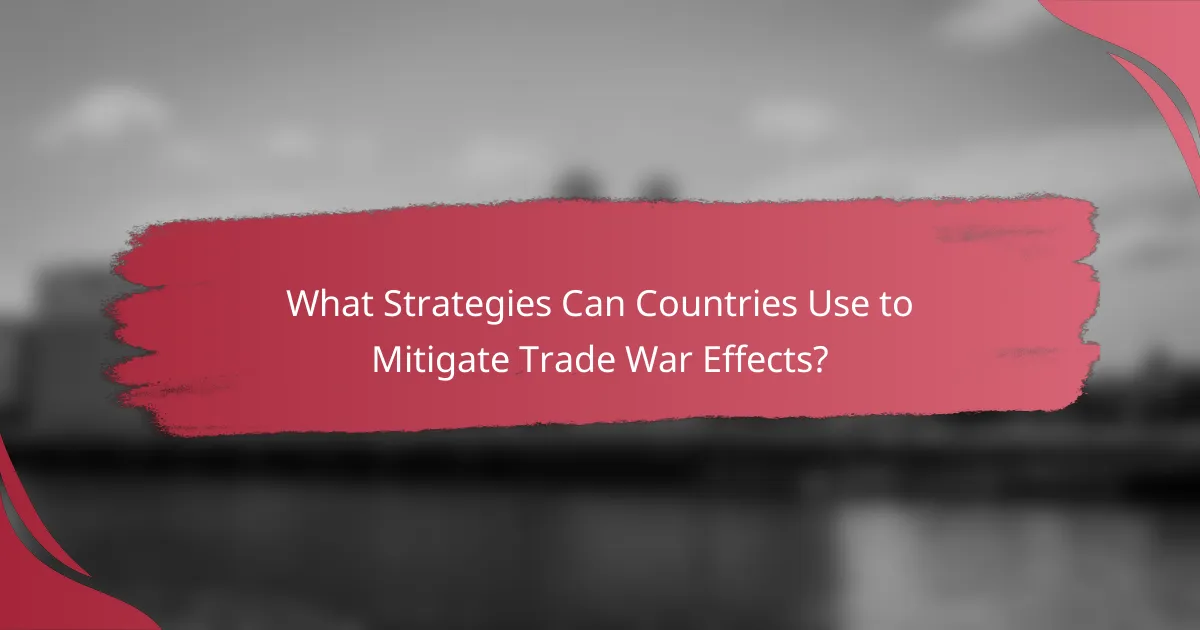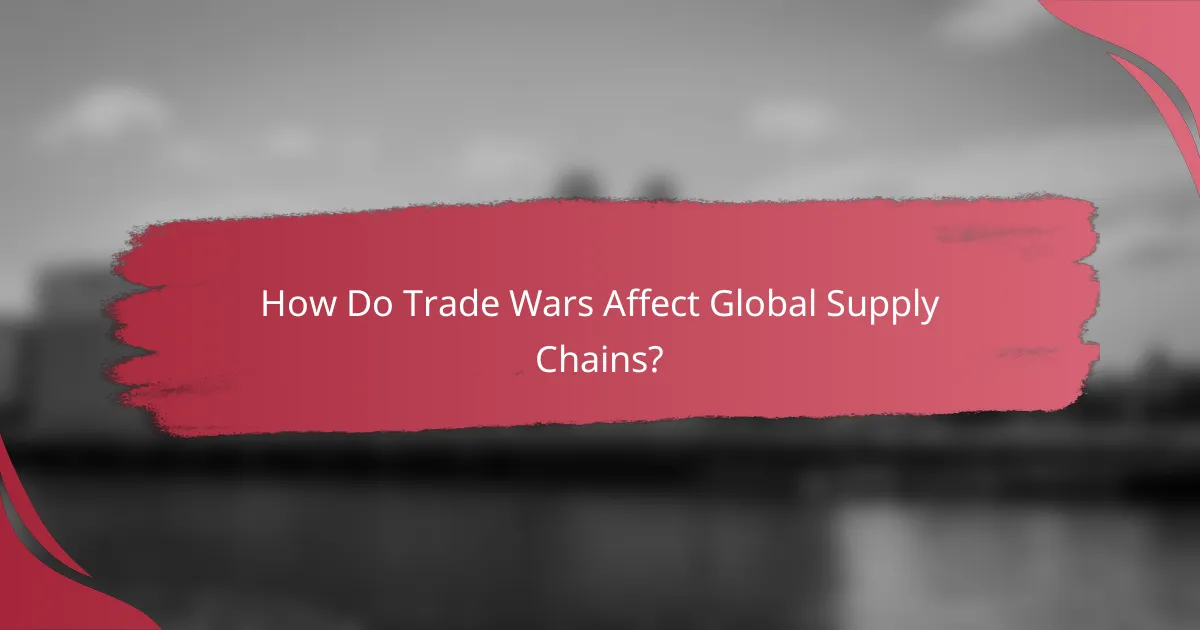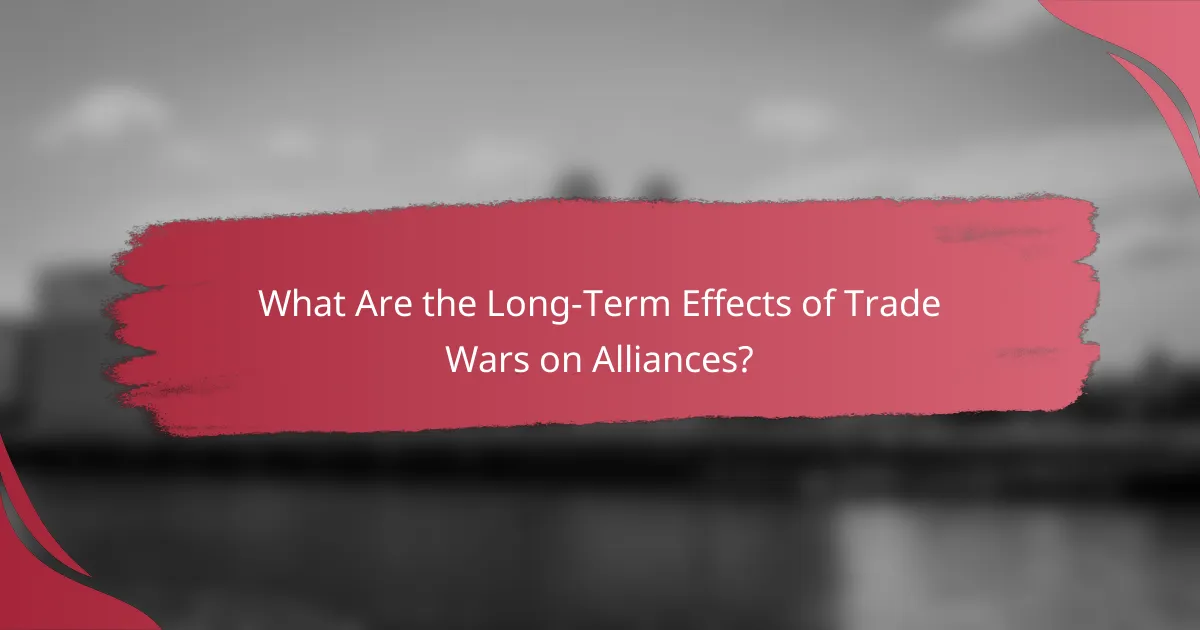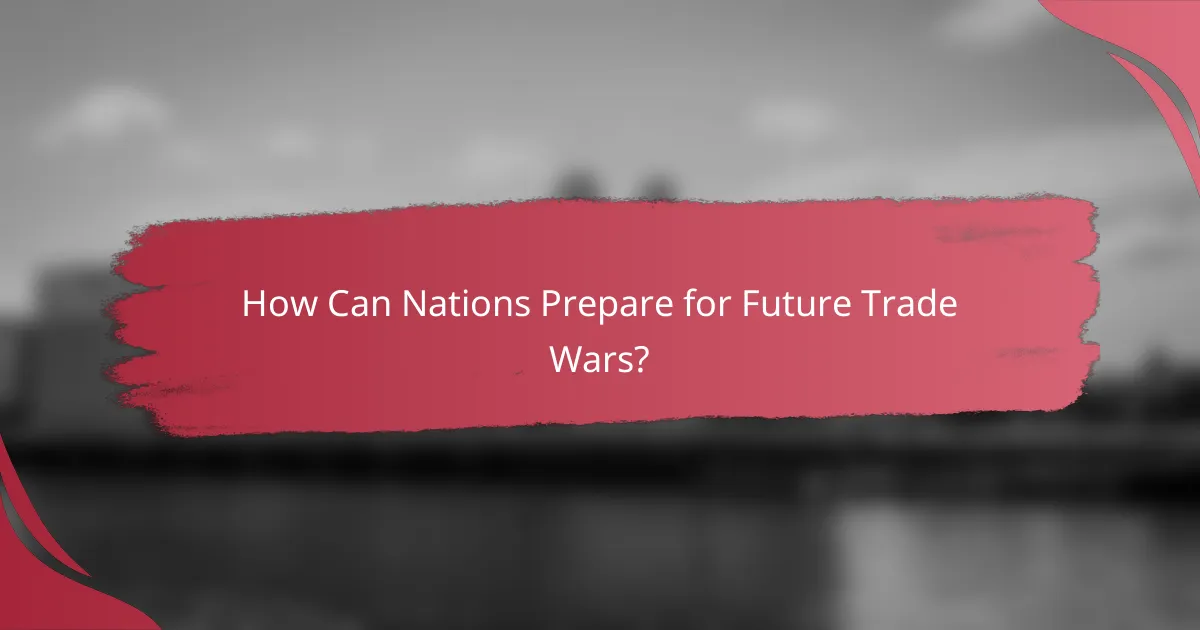Trade wars have a profound impact on geopolitical alliances, as nations adjust their diplomatic and economic relationships in response to tariffs and trade barriers. This realignment often leads to new partnerships and shifts in military collaborations, illustrating the intricate link between economic policies and global power dynamics.

How Do Trade Wars Impact Geopolitical Alliances?
Trade wars significantly influence geopolitical alliances by reshaping diplomatic ties, military collaborations, and economic dependencies among nations. As countries impose tariffs and trade restrictions, they often realign their partnerships to mitigate economic fallout and enhance strategic positioning.
Shifts in diplomatic relations
Trade wars can lead to a reevaluation of diplomatic relations as countries seek new alliances to counteract the effects of tariffs and trade barriers. Nations may strengthen ties with countries that share similar trade interests or political ideologies, while distancing themselves from traditional partners that impose restrictive measures.
For example, during recent trade tensions between the U.S. and China, several countries in Southeast Asia have sought to bolster their relationships with both superpowers, aiming to attract investment and trade opportunities from both sides. This shift can create a more multipolar world where smaller nations leverage their position to gain economic benefits.
Changes in military partnerships
As trade wars escalate, military partnerships may also shift in response to new geopolitical realities. Countries affected by trade disputes may seek to enhance their defense collaborations with allies who share similar economic interests, thereby creating a more cohesive military front.
For instance, nations like India have increased military cooperation with the U.S. in light of trade tensions with China, recognizing the need for strategic alliances that extend beyond economic considerations. This shift can lead to joint military exercises and arms agreements that strengthen regional security.
Economic dependency alterations
Trade wars can alter economic dependencies as countries reassess their reliance on specific trading partners. Nations may diversify their supply chains and seek alternative markets to reduce vulnerability to tariffs and trade disruptions.
For example, countries heavily dependent on Chinese manufacturing may look to Southeast Asian nations or India as alternative sources for goods. This diversification can lead to a more resilient economic landscape but may also create tensions with previously dominant partners.

What Are the Key Examples of Trade Wars?
Trade wars are conflicts between countries characterized by the imposition of tariffs or other trade barriers. Key examples include the US-China trade conflict, EU-Russia sanctions, and US-Mexico tariff disputes, each illustrating how economic measures can influence geopolitical relationships.
US-China trade conflict
The US-China trade conflict began in 2018 when the United States imposed tariffs on hundreds of billions of dollars’ worth of Chinese goods. In response, China retaliated with its own tariffs, affecting American exports, particularly in agriculture and manufacturing.
This conflict has led to significant shifts in global supply chains, with companies reconsidering their manufacturing locations to avoid tariffs. Businesses should monitor ongoing negotiations and be prepared for changes in trade policy that could impact costs and market access.
EU-Russia sanctions
The EU-Russia sanctions were implemented in response to Russia’s annexation of Crimea in 2014. These sanctions targeted key sectors of the Russian economy, including finance, energy, and defense, restricting access to European markets and technology.
As a result, Russia has sought to strengthen ties with non-Western countries and develop domestic industries. Companies operating in or with Russia must navigate these sanctions carefully to avoid legal repercussions and financial losses.
US-Mexico tariff disputes
The US-Mexico tariff disputes have revolved around issues such as immigration and trade imbalances. In 2019, the US threatened to impose tariffs on Mexican goods unless Mexico took action to curb illegal immigration.
This situation highlights the interconnectedness of trade and political issues. Businesses engaged in cross-border trade should stay informed about potential tariffs and be ready to adapt their supply chains or pricing strategies accordingly.

What Strategies Can Countries Use to Mitigate Trade War Effects?
Countries can employ various strategies to mitigate the adverse effects of trade wars, including diversifying trade partners, strengthening regional alliances, and implementing protective tariffs. These approaches help maintain economic stability and foster resilience in the face of international trade tensions.
Diversifying trade partners
Diversifying trade partners involves expanding a country’s trade relationships beyond its primary partners to reduce dependence on any single nation. This strategy can help mitigate risks associated with trade wars, as it allows countries to shift their imports and exports to alternative markets.
For example, a country heavily reliant on trade with one nation can seek new agreements with countries in different regions, such as Southeast Asia or Africa. This not only spreads risk but can also lead to better trade terms and opportunities for economic growth.
Strengthening regional alliances
Strengthening regional alliances can enhance economic cooperation and provide a buffer against trade conflicts. By collaborating with neighboring countries, nations can create a more integrated economic environment that supports mutual trade interests.
For instance, countries within the European Union benefit from reduced tariffs and harmonized regulations, making it easier to trade among themselves. This regional cooperation can help member states withstand external trade pressures and foster collective bargaining power.
Implementing protective tariffs
Implementing protective tariffs can serve as a short-term measure to shield domestic industries from foreign competition during trade wars. By imposing tariffs on imported goods, countries can encourage consumers to buy local products, thus supporting domestic businesses.
However, while protective tariffs can provide immediate relief, they may also lead to retaliation from trading partners and increased prices for consumers. Countries should carefully assess the potential long-term impacts and consider balancing tariffs with other strategies to promote sustainable trade practices.

How Do Trade Wars Affect Global Supply Chains?
Trade wars significantly disrupt global supply chains by introducing tariffs and trade barriers that alter the flow of goods. These changes can lead to delays, increased costs, and a reevaluation of sourcing strategies among businesses worldwide.
Disruption of supply routes
Trade wars can cause significant disruptions in established supply routes, leading to delays in the delivery of goods. For instance, tariffs may incentivize companies to reroute shipments through alternative countries, which can increase transit times and complicate logistics.
Additionally, the uncertainty surrounding trade policies can lead to congestion at ports as businesses rush to import or export goods before new tariffs take effect. This unpredictability can strain transportation networks and increase the risk of stock shortages.
Increased production costs
As tariffs are imposed on imported materials, production costs for manufacturers can rise sharply. Companies may face higher prices for raw materials sourced from countries affected by trade disputes, which can squeeze profit margins.
Furthermore, businesses may need to invest in new technologies or processes to adapt to changing regulations, adding to their operational expenses. For example, a manufacturer relying on steel imports may need to find alternative suppliers, which could be more expensive or less reliable.
Shifts in sourcing strategies
In response to trade wars, many companies are reevaluating their sourcing strategies to mitigate risks. This may involve diversifying suppliers across different regions to avoid over-reliance on a single country that is subject to tariffs.
Some businesses are also considering nearshoring, moving production closer to their primary markets to reduce transportation costs and lead times. For instance, a U.S. company might shift some manufacturing from Asia to Mexico to benefit from lower shipping costs and reduced tariff exposure.

What Are the Long-Term Effects of Trade Wars on Alliances?
Trade wars can significantly reshape geopolitical alliances by altering economic relationships and influencing national policies. Over time, these conflicts may lead to realignments in global power structures, increased economic nationalism, and the emergence of new trade agreements.
Realignment of global power structures
Trade wars often force countries to reassess their alliances and partnerships. Nations may seek new alliances that align with their economic interests, leading to a shift in global power dynamics. For example, countries heavily reliant on exports may turn towards emerging markets to diversify their trade relationships.
This realignment can result in the formation of new blocs or coalitions, as nations band together to counterbalance dominant economies. Such shifts can impact international diplomacy and influence global governance structures.
Increased economic nationalism
As trade wars escalate, countries may adopt more protectionist policies, fostering economic nationalism. This trend can manifest in tariffs, import quotas, and local content requirements, aimed at bolstering domestic industries. For instance, a country might prioritize local manufacturers over foreign competitors, affecting international supply chains.
Economic nationalism can also lead to public sentiment favoring local products, which may further entrench these policies. This shift can create friction between nations and complicate existing trade agreements.
Potential for new trade agreements
In the wake of trade wars, there is often a push for new trade agreements that reflect the changing economic landscape. Countries may pursue bilateral or multilateral agreements to secure favorable terms and access to new markets. For example, nations affected by tariffs might negotiate trade deals that eliminate barriers and promote cooperation.
These new agreements can provide opportunities for economic growth and collaboration, but they may also come with challenges, such as negotiating terms that satisfy all parties involved. Countries should carefully evaluate the potential benefits and drawbacks of entering new trade agreements in a shifting geopolitical context.

How Can Nations Prepare for Future Trade Wars?
Nations can prepare for future trade wars by diversifying their trade partnerships, strengthening domestic industries, and developing strategic reserves. These proactive measures can mitigate the adverse effects of sudden trade disruptions.
Diversifying Trade Partnerships
Diversifying trade partnerships involves establishing relationships with multiple countries to reduce reliance on any single market. This approach can help nations buffer against tariffs or sanctions imposed by one trading partner. For example, a country heavily reliant on a specific nation for imports might seek to engage with other suppliers to ensure a steady flow of goods.
Countries can also explore trade agreements with emerging markets, which may offer new opportunities and lower competition. By expanding their trade networks, nations can enhance their economic resilience and adaptability in the face of trade conflicts.
Strengthening Domestic Industries
Investing in and strengthening domestic industries is crucial for nations to withstand trade wars. This can involve providing subsidies, tax incentives, or grants to local businesses to boost production capabilities. A robust domestic sector can reduce dependence on foreign goods and services, making a country less vulnerable to external pressures.
Additionally, fostering innovation and technology within local industries can lead to increased competitiveness. Countries should prioritize research and development initiatives that enable their industries to thrive independently of global supply chains.
Developing Strategic Reserves
Developing strategic reserves of essential goods can provide a buffer during trade disruptions. Nations should identify critical resources, such as food, energy, and raw materials, and maintain stockpiles to ensure availability in times of crisis. This practice can help stabilize markets and prevent shortages that may arise from trade conflicts.
Establishing clear guidelines for the management and replenishment of these reserves is vital. Countries should regularly assess their needs and adjust their stockpiles accordingly, ensuring they are prepared for potential trade wars while minimizing waste and inefficiency.



